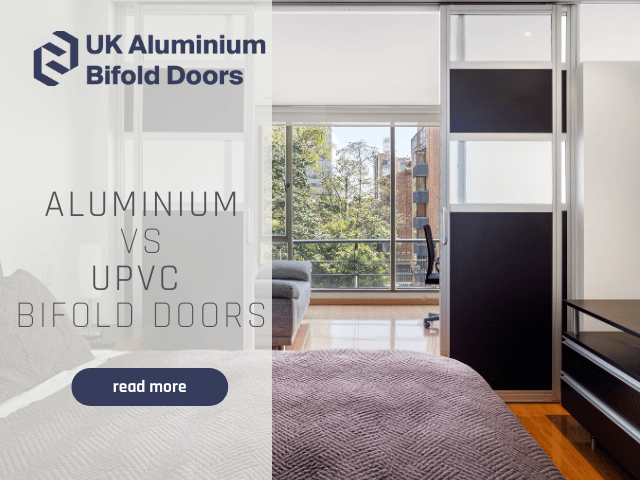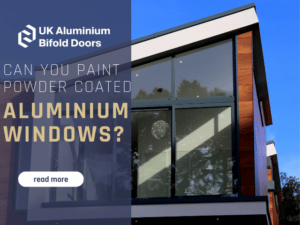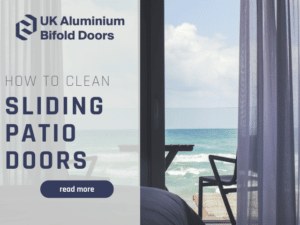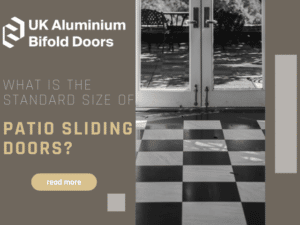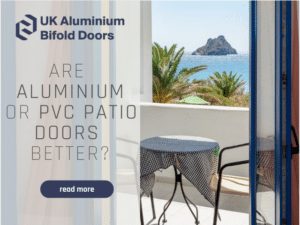Aluminium bifold doors have increased their legitimacy as a player in the market with recent technological improvements compared with the older aluminium door ranges from yesteryear.
Homeowners are seeing the modern aluminium bifold doors in a different light as they’re more appealing from a variety of perspectives – they’re pleasing on the eye, super-strong and have top-notch sustainability and durability. These doors are also good at keeping out the cold and providing excellent indoor insulation.
In this article, we’ll compare an aluminium door, like the bifold doors we supply, to another popular bifold door on the market, the uPVC door.
Many people view uPVC bifold doors as the poor relatives of aluminium and timber doors, but there is no doubt that they serve a purpose on the market. Let’s compare the two makes of door, and you can decide which your choice would be.
We also have a guide comparing aluminium and timber bifold doors here, so you can see which material is the best on the market.
Aluminium vs uPVC Bifold Doors: Head-to-Head
We’re going to assess both aluminium and uPVC doors from several perspectives, taking into account their positive and not-so-positive qualities. This will enable you to make an informed decision if you’re in the market for a new bifold door. We’ll investigate six categories to provide clear insight into both types of doors.
Durability & maintenance
From a durability perspective, aluminium bifold doors are built to last and are estimated to remain strong for 40 to 45 years if properly maintained. Of course, they would require some maintenance during this extended period, but, likely, there won’t be much to do apart from cleaning the tracks and lubricating the working parts.
The next most likely maintenance needed will be the odd aluminium bifold door hinge adjustment, but apart from that, aluminium bifolding doors are very low maintenance investments.
Aluminium doors don’t warp or degrade; their frames are powder coated, making them resistant to scratching and fading. They also don’t expand and contract in extreme temperatures, so you’re not likely to experience difficulty opening or closing your doors.
uPVC doors are comparatively inexpensive, with a life expectancy of 25-35 years if properly maintained. uPVC doors are durable and can withstand many weather conditions but may struggle in extreme weather. uPVC has been known to expand and contract by nearly three millimetres per metre when drastic temperature changes occur.
In practice, this expansion means that uPVC doors can be challenging to open and close during warmer weather. If this is the case, you can either wait a while to close your door or spray it down with cold water to encourage faster contraction. Without this, you’re likely to have to force your door closed.
uPVC doors are also prone to fading as they don’t utilise the same powder coating as aluminium doors. If your uPVC door is south or west-facing, it will get greater UV light exposure. After a while, the door’s colour will reflect less light as it begins to weather, leaving it looking less appealing and slightly dull.
If you anticipate bright sunshine beating down on your home, consider selecting lighter colour doors, especially if you’re going with uPVC bifolds.
Regarding general maintenance, there isn’t much to choose between uPVC and aluminium when cleaning. Both are low maintenance, and cleaning a uPVC and aluminium door amounts to wiping it down with a damp cloth.
Strength
Aluminium is a naturally strong metal, which is perfect for an external door. It gets its strength from how it’s manufactured and the chemical composition of the compound itself. High-strength alloys and additives combine to increase an already-strong product. Processing restricts the movement of atomic particles, providing an even stronger finished product.
Considering that aluminium is utilised in high-strength constructions like spacecraft, aircraft, highrise buildings and shark cages, it’s no wonder that using it enhances your security features.
Our aluminium doors include slim sightlines, providing natural light and more attainable views. The thin aluminium profiles on its frames are only possible because of the inherent strength of aluminium products. The initial cost of aluminium might scare specific potential buyers, but the long-term investment you’re buying into will reap the rewards in the end.
The strong aluminium frames also allow wider panes and enhanced strength through fewer panels. This means more glass and better visibility too.
uPVC doors, unfortunately, don’t compare favourably with aluminium when it comes to strength. Aluminium bifold frames can be up to three times as strong as uPVC frames.
Insulation
Aluminium bifold doors make use of polyamide thermal break technology. The technology reduces heat transference, meaning your home stays comfortable and warm, as well as reduce the chances of condensation on your aluminium bifold doors.
Thermal break fits between the inside and outside of the profiles of aluminium frames through a reinforced polyamide strip. This strip creates an insulated barricade within the door or window frame.
As a result of polyamide thermal break technology and triple or double-glazing, aluminium bifold doors offer excellent thermal efficiency.
The voting is still out on the thermal efficiency of uPVC bifold doors, but a lot seems to hinge on the specific uPVC door manufacturer. Most manufacturers offer double or triple-glazing options, but there’s no consensus on the overall insulative qualities of uPVC. Some doors can offer better insulation than an aluminium door, while others don’t.
Sustainability & energy efficiency
Aluminium is certainly a sustainable construction material which means, nowadays, most homeowners will have no problems considering it as an option for their new doors. Aluminium doors offer 100% recyclability, which minimises your carbon footprint.
uPVC and aluminium are more energy efficient than timber due to wood’s expansion and contraction in varying temperatures. uPVC doors expand and contract but not to the same degree as timber doors, whereas aluminium doors aren’t affected by extreme weather conditions.
Aesthetic & curb appeal
Suppose you’re a contemporary, modern homeowner. In that case, you’ll likely be very keen on getting some aluminium bifold doors for your front facade, as they’re ultra-stylish and will add to the market value of your home.
A door’s colour speaks volumes about the personalities of its residents, so read up on what colours and styles will suit your home and allow you to feel most comfortable. Aluminium doors are not restricted by colour, with a full range of RAL colour management system colours available for potential purchasers.
As aluminium doors are custom-made, numerous design options are available to homeowners. uPVC doors are slightly more limited in colours and designs, but several attractive alternatives are still available.
Price
The cost-effective option when you compare aluminium vs uPVC is definitely the latter. Aluminium bifold doors are more expensive, but they also include a more extended guarantee, with some guarantees being as long as 20 years. In contrast, the average warranty on a uPVC bifold door is ten years.
An aluminium bifold door can set you back £3,800, including installation, while similar-sized uPVC bifolds can cost you approximately £2,000, which is quite a substantial saving.
Perhaps it’s only an initial saving, though, considering what you’ve already read in our assessment. In the long run, it’s up to you and your fellow customers to decide which is the best option for you, and, in the long run, your decision alone counts. Visit our blog for more information that might assist you.
FAQs
Are PVC bifold doors worthwhile?
In general, uPVC products provide decent security and energy efficiency levels and are cost-effective options and low-maintenance solutions. As bifold doors, the uPVC contraction levels at ambient temperatures might harm products with longer openings.
Do bifold doors made of aluminium expand in the heat?
Aluminium is a robust and rigid material, so the frames are generally thinner than UPVC. For this reason, they will not contract or expand like a UPVC door, so you shouldn’t worry about closing or opening your door because of the sun’s heat.
Can you break into aluminium bifold doors easily to break into?
Some people believe that the concertina-like way an aluminium door opens means it’s easy to penetrate. This is false, as modern bifold doors come with multi-point locking systems.
https://ukaluminiumbifolddoors.co.uk/tips-and-advice/aluminium-bifold-door-hinge-adjustment
https://ukaluminiumbifolddoors.co.uk/
https://ukaluminiumbifolddoors.co.uk/tips-and-advice
https://www.vufold.co.uk/advice-centre/bi-fold-doors-advice/external/aluminium-upvc#ql3

